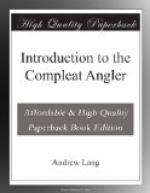Our Saviour’s peculiar affection for fishermen is, of course, a powerful argument. And it is certain that Peter, James, and John made converts among the twelve, for ’the greater number of them were found together, fishing, by Jesus after His Resurrection.’ That Amos was ’a good-natured, plain fisherman,’ only Walton had faith enough to believe. He fixes gladly on mentions of hooks in the Bible, omitting Homer, and that excellent Theocritean dialogue of the two old anglers and the fish of gold, which would have delighted Izaak, had he known it; but he was no great scholar. ’And let me tell you that in the Scripture, angling is always taken in the best sense,’ though Izaak does not dwell on Tobias’s enormous capture. So he ends with commendations of angling by Wotton, and Davors (Dennys, more probably) author of The Secrets of Angling (1613). To these we may add Wordsworth, Thomson, Scott, Hogg, Stoddart, and many minor poets who loved the music of the reel.
Izaak next illustrates his idea of becoming mirth, which excludes ‘Scripture jests and lascivious jests,’ both of them highly distasteful to anglers. Then he comes to practice, beginning with chub, for which I have never angled, but have taken them by misadventure, with a salmon fly. Thence we proceed to trout, and to the charming scene of the milkmaid and her songs by Raleigh and Marlowe, ’I think much better than the strong lines that are now in fashion in this critical age,’ for Walton, we have said, was the last of the Elizabethans and the new times were all for Waller and Dryden. ‘Chevy Chace’ and ‘Johnny Armstrong’ were dear to Walton as to Scott, but through a century these old favourites were to be neglected, save by Mr. Pepys and Addison. Indeed, there is no more curious proof of the great unhappy change then coming to make poetry a mechanic art, than the circumstance that Walton is much nearer to us, in his likings, than to the men between 1670 and 1770. Gay was to sing of angling, but in ’the strong lines that are now in fashion.’ All this while Piscator has been angling with worm and minnow to no purpose, though he picks up ’a trout will fill six reasonable bellies’ in the evening. So we leave them, after their ale, in fresh sheets that smell of lavender.’ Izaak’s practical advice is not of much worth; we read him rather for sentences like this: ’I’ll tell you, scholar: when I sat last on this primrose bank, and looked down these meadows, I thought of them as Charles the Emperor did of the city of Florence, “that they were too pleasant to be looked upon, but only on holy-days."’ He did not say, like Fox, when Burke spoke of ’a seat under a tree, with a friend, a bottle, and a book,’ ‘Why a book?’ Izaak took his book with him—a practice in which, at least, I am fain to imitate this excellent old man.




